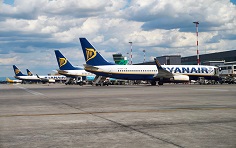ii view: Ryanair shares take off despite reporting big loss
Passenger numbers have plummeted, but a strong balance sheet helps Ryanair shares outperform rivals.
2nd November 2020 11:44
by Keith Bowman from interactive investor
Passenger numbers have plummeted, but a strong balance sheet helps Ryanair shares outperform rivals.

First-half results to 30 September
- Revenue down 78% to €1.18 billion
- Loss of €197 million, down from a profit of €1.15 billion
- Cash held of €4.5 billion
ii round-up:
Low-cost airline Ryanair (LSE:RYA) today warned of bigger second-half loss and the potential for a further cut to winter flight capacity, as governments across Europe continued to reimpose Covid-19 population lockdowns.
Passenger numbers for the six months to the end of September plummeted by 80% to 17 million from a prior year 85.7 million. That resulted in a first-half loss of €197 million. The results came in the wake of a move by Boris Johnson’s government to return England to lockdown.
Ryanair shares had risen almost 5% by Monday lunchtime, having fallen by around a fifth year-to-date. Shares for rival easyJet (LSE:EZJ)are down by two-thirds in 2020, while shares for British Airways owner IAG (LSE:IAG) are down by over 75%.
A €1.25 billion share and bond fundraising in September helped push Ryanair's cash liquidity as at the end of September to €4.5 billion, up from €3.9 billion in late June.
Despite significant falls in both revenue and profit, both proved marginally better than City estimates. Cost cutting, including temporary staff pay cuts, helped reduce losses, while increased fees paid for reserved seating and priority boarding aided revenues.
Guidance is unchanged for full-year passenger numbers to the end of March 2021 of 38 million, down from last year’s 149 million. However, that could be adjusted depending on how lockdowns unfold.
The airline remains in talks with aircraft maker Boeing (NYSE:BA) regarding compensation for delayed deliveries of its new MAX planes. The aircraft was previously grounded by US authorities following two accidents. It hopes to receive the first 30 MAX jets in time for its peak summer season next year. It has 4% more seats, 16% lower fuel burn and 40% lower noise emissions compared to current alternatives.
ii view:
Ryanair connects over 240 destinations in 40 countries with a fleet of 470 aircraft, and a further 210 Boeings on order. Factors outside of management’s control, such as fuel costs, the weather and strikes, can make investing in airline companies more volatile than many other industries. Now, the Covid-19 pandemic has given it its biggest ever crisis.
Significantly reduced passenger numbers, given government travel restrictions, have left airlines in a battle for survive. Carriers such as Flybe, Germanwings and Level have already closed. Cash is now king. Many operators, including Ryanair, have moved to raise cash. Broker Morgan Stanley estimates that Ryanair's cash of €4.5 billion should be enough to see it through 18 months of grounded aircraft. Ryanair also highlights that almost 80% of its fleet is unencumbered, or not currently used as loan security, and has a book value of over €7 billion.
For investors, one of the strongest balance sheets in the industry offers comfort. The continued delivery of new aircraft also serves to underline management’s confidence in its longer-term future. But the degree of uncertainty caused by the pandemic is still sizeable. Potential pending Brexit disruption also feeds into the mix. In all, while Ryanair’s chances of surviving and prospering post the pandemic look favourable, any investment still carries significant risk.
Positives:
- Cash liquidity of €4.5 billion
- Almost 80% of its fleet is unencumbered
Negatives:
- Highly uncertain outlook due to Covid-19
- Considers EU assistance to rivals unfair
The average rating of stock market analysts:
Buy
These articles are provided for information purposes only. Occasionally, an opinion about whether to buy or sell a specific investment may be provided by third parties. The content is not intended to be a personal recommendation to buy or sell any financial instrument or product, or to adopt any investment strategy as it is not provided based on an assessment of your investing knowledge and experience, your financial situation or your investment objectives. The value of your investments, and the income derived from them, may go down as well as up. You may not get back all the money that you invest. The investments referred to in this article may not be suitable for all investors, and if in doubt, an investor should seek advice from a qualified investment adviser.
Full performance can be found on the company or index summary page on the interactive investor website. Simply click on the company's or index name highlighted in the article.